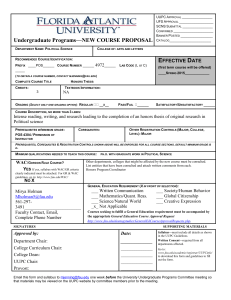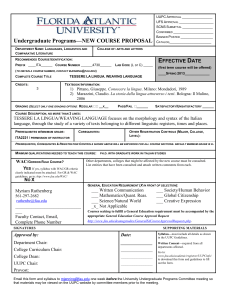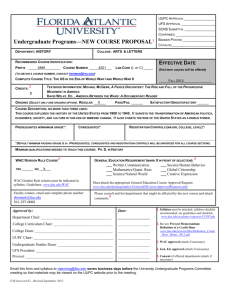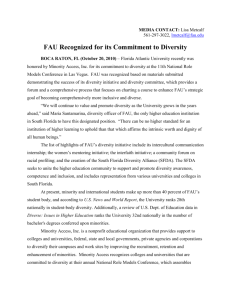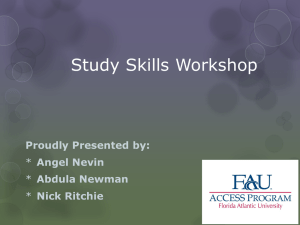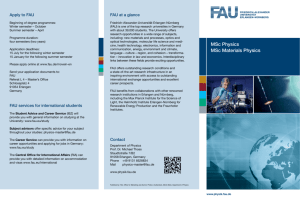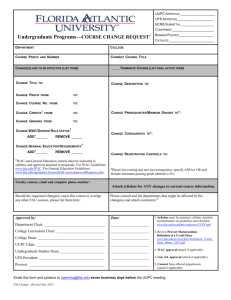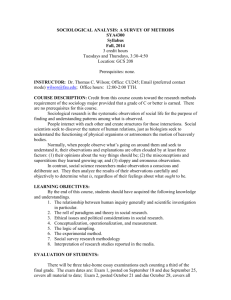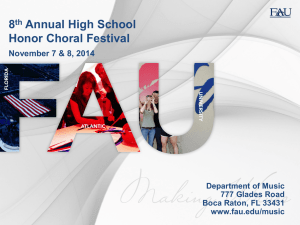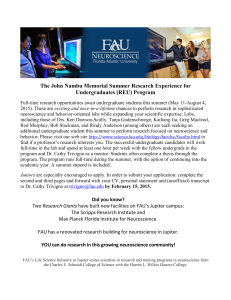Degree programmes taught in English - Friedrich
advertisement
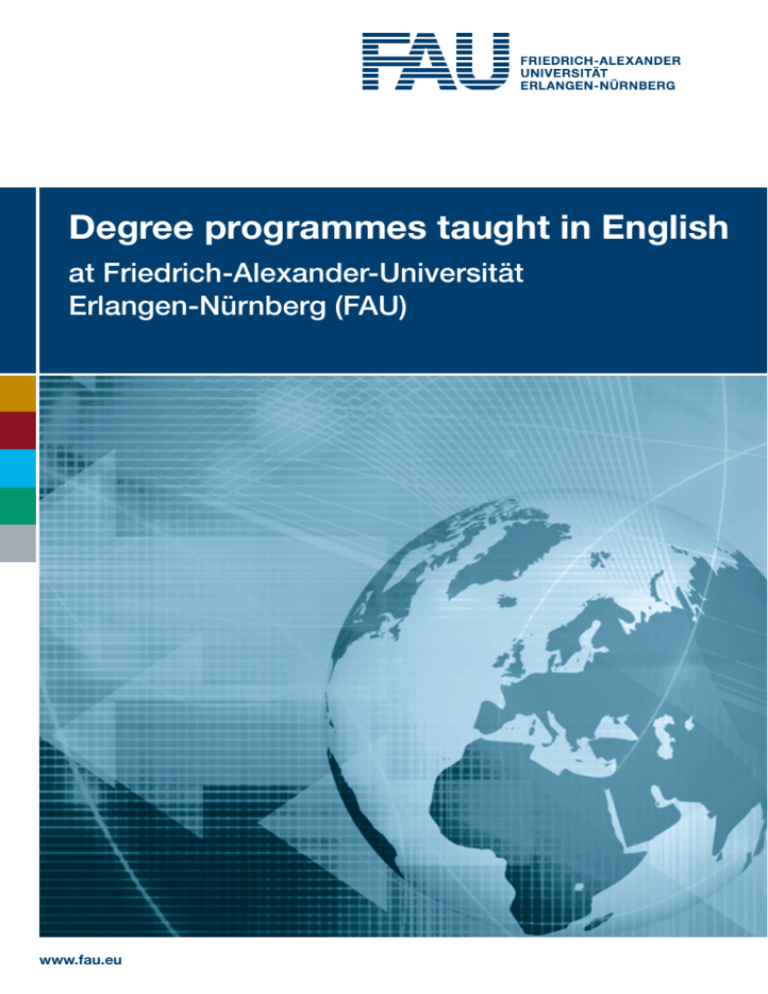
Degree programmes taught in English at Friedrich-Alexander-Universität Erlangen-Nürnberg (FAU) www.fau.eu FAU in numbers At a glance Strength in research • 35,500 students, 2,500 of them from abroad • 12,000 employees, including • 640 professors • 3,000 research associates • 2,000 administrative staff • 5 faculties • 156 degree programmes, among them , • 66 Bachelor s degree programmes , • 79 Master s degree programmes (incl. 5 Continuing Professional Development programmes) • 11 State Examination/Magister degree programmes Programmes offered include: • 5 Elite degree programmes • • • • • • • • • • • • • • 1 Cluster of Excellence Engineering of Advanced Materials (EAM) 1 Graduate School Graduate School in Advanced Optical Technologies (SAOT) 1 Max Planck Institute for the Science of Light (MPL) 1 Helmholtz Institute Erlangen-Nürnberg for Renewable Energy (HI ERN) 4 DFG Collaborative Research Centres (CRC) 5 Transregios (CRC applied for jointly with another university) 8 DFG Research Groups 8 DFG Research Training Groups 1 DFG Priority Programme 1 International Research Centre funded by the Federal Ministry of Education and Research 2 Fraunhofer Institutes 25 Interdisciplinary Centres 9 Emerging Fields Initiative projects €160 million in third-party funding International • • • • 500 partnerships with higher education institutions in more than 70 countries 5 international doctoral programmes in the Elite Network of Bavaria 2 Bavarian University Centres for Latin America (BAYLAT) and California (BaCaTec) 1 Confucius Institute in co-operation with the Beijing Foreign Studies University • 22 international degree programmes, including • 18 degree programmes taught in English • 7 double degree programmes • 2 degree programmes taught in other languages 2| |3 FAU profile Founded in 1743, Friedrich-Alexander-Universität Erlangen-Nürnberg (FAU) is now one of the largest research universities in Germany. The five faculties at FAU offer a unique range of subjects and the chance to work closely with internationally renowned researchers. Interdisciplinary research groups bring together researchers from different faculties. The research areas of special international renown are: i) New Materials and Processes, ii) Optics and Optical Technologies, iii) Molecular Life Science and Medicine, iv) Health Technology, v) Electronics, Information and Communication, vi) Energy, Environment and Climate, vii) Language – Culture – Region, and viii) Cohesion – Transformation – Innovation in Law and Economics. In recognition of its outstanding performance, FAU receives special state funding for selected research initiatives, among them the Cluster of Excellence 'Engineering of Advanced Materials and Processes' and the Erlangen Graduate School in Advanced Optical Technologies, the national Leading Edge Cluster 'Medical Valley' and the International Consortium for Research in the Humanities 'Fate, Freedom and Prognostication. Strategies for Coping with the Future in East Asia and Europe'. FAU offers ideal research conditions with intensive supervision and support for graduates, doctoral candidates, and junior researchers. Research and teaching infrastructure at FAU is state-of-the-art. Furthermore, the University and thus its students benefit from close collaboration with external research institutions in Erlangen and Nuremberg, such as the Max Planck Institute for the Science of Light, the newly-founded Helmholtz Institute Erlangen-Nürnberg for Renewable Energy and two Fraunhofer Institutes. One of the results of these collaborations is world famous: researchers at FAU and the Fraunhofer Institute for Integrated Circuits developed the MP3 format together. In this inspiring environment, our students benefit from an outstanding academic education which offers international perspective and excellent career opportunities. The degree programmes that can be studied partly or completely in English are of particular interest to international applicants. Currently more than 500 international students , are enrolled in 18 Master s degree programmes taught in English. 4| |5 Students also have the option of studying at the FAU Busan Branch Campus in South Korea. All graduates of FAU Busan receive a German MSc degree. They are simultaneously registered at FAU which allows them to carry out parts of their studies in Germany. www.fau.de/master/cbe www.fau-busan.ac.kr Degree programmes taught in English at FAU Engineering MSc Advanced Materials and Processes (Elite degree programme): This programme unites materials science with chemical engineering and bioengineering. Technical knowledge of materials is of great importance for seminal research and teaching in chemical engineering and bioengineering, and new materials are increasingly derived from processes of particle technology. MAP offers four focal subjects combining these fields: Biomaterials and Bioprocessing, Nanomaterials and Nanotechnology, Computational Materials Science and Process Simulation, and Advanced Processes. Besides the technical lectures this special programme offers a lot of practical applications (e.g. mini projects, industrial internship) and soft skills to improve students’ interpersonal qualifications. MAP is one of the cutting-edge programmes funded by the Bavarian Elite Network. www.fau.de/master/map MSc Advanced Optical Technologies (Elite degree programme): As part of the Elite Network of Bavaria, MAOT provides training in modern optics – a key technology for the 21st century. Erlangen is a leading centre for optics. The PhD programme SAOT, the Max Planck Institute for the Science of Light, the Fraunhofer Institutes, and the Bavarian Laser Centre collaborate with MAOT. The course covers six subjects: Optics in Communication, Optics in Medicine, Optical Material and Systems, Optical Material Processing, Optical Metrology, and Computational Optics. The interdisciplinary lectures are held in small groups by experts in engineering, physics, and medicine. www.fau.de/master/aot MSc Chemical and Biological Engineering: This Master’s programme aims at educating engineers for careers in the chemical, petrochemical, and pharmaceutical industries, in biological and environmental process technology or in the energy sector, and at preparing them for the complex tasks in these fields. A balance between practice and theory and an orientation towards industrial and social developments is achieved in a curriculum including both fundamentals and modern topics from current research, and by close co-operation with the relevant industries. 6| MSc Communications and Multimedia Engineering: This programme emphasises the fundamental concepts of advanced communications and multimedia as a preparation for cutting-edge research and development. CME technologies have experienced rapid growth and have attained high economic importance worldwide. Examples are numerous in digital speech, audio and video coding, digital transmission, and communication networks. The high-profile, researchoriented faculty entertains strong links with domestic and international hightech industry and helps students establish contacts with leading companies in audio technology, medical systems, and mobile and optical communications. www.fau.de/master/cme MSc Computational Engineering: This programme is an innovative discipline fusing the expertise of established engineering fields, computational sciences, and applied mathematics. It was created in response to an increasing demand for high-performance computing in a variety of scientific and technical fields. In addition, it is possible to obtain an MSc degree with the Bavarian Graduate School of Computational Engineering (BGCE, www.bgce.de) or a double degree with KTH, the Royal Institute of Technology in Sweden, or within the framework of the Erasmus Mundus programme Computer Simulations for Science and Engineering (COSSE). www.fau.de/master/ce www.kth.se/en/studies/programmes/master/em/cosse MSc Medical Engineering, branch of study Medical Imaging and Data Processing: The programme is a technical and research-driven Master’s degree programme with a specialised focus on medical needs. Students are familiarised with systematic and instrumental methods and acquire professional and methodological skills. Thanks to the interdisciplinary content, graduates are highly qualified for a career in medical image and data processing. Methods for developing software systems in medical engineering are taught, ranging from basic algorithms for image improvement, image reconstruction, and image registration to computeraided diagnostic support and hospital information systems. www.fau.de/master/medical-engineering |7 Degree programmes taught in English at FAU Natural Sciences MSc Chemistry: This degree programme has a strong focus on research and is divided into three main modules: Organic Chemistry, Inorganic Chemistry and Physical Chemistry. During their studies, students may focus on a variety of different research areas, among them food chemistry, crystallography, nano-electronics, microbiology, electrochemistry, and biochemistry. In summer 2012, the degree programme was awarded the European Euromaster® label. www.fau.de/master/chemistry MSc Materials Physics: This course focuses on the physical properties of materials. It includes advanced solid state physics, lab courses on experimental methods in , solid state physics, and specialisation in a research subject leading to a Master s thesis. Courses on mechanical, electrical, and optical properties of selected materials; soft matter physics; biophysics; theoretical and computer physics; or special , aspects of materials engineering and chemistry can be chosen. The Master s thesis is closely connected to the research of the EAM Cluster of Excellence, the interdisciplinary centres for molecular materials and interface-controlled processes (ICMM, ICICP), and to the Max Planck Institute for the Science of Light (MPL). www.fau.de/master/materials-physics MSc Physics: This programme includes one year of coursework and, subsequently, a one-year training phase directed towards performing independent research. It aims at advanced training in selected fields of physics and offers the opportuni, ty for specialisation. The Master s degree qualifies graduates for a subsequent doctoral thesis. The subjects reflect the physics research pursued at FAU. Focus points are astrophysics and astroparticle physics, optical sciences and solid-state physics on the experimental side, and computational and statistical physics, lightmatter interaction, quantum gravity, and condensed matter physics on the theoretical side. Optionally, special Master’s courses can be selected with a focus on Physics in Medicine. www.fau.de/master/physics Physics Advanced (Graduate and Doctoral Programme of the Elite Network of Bavaria): Physics Advanced is an international study programme that integrates research with coursework at the BSc, MSc, and doctoral level. Students receive intensive mentoring and an individually tailored study programme that can provide a fast-track to graduation. Physics Advanced is open to exceptionally talented and motivated students. Physics Advanced combines courses on optics, quantum field theory, astroparticle and condensed matter physics with early immersion into cutting-edge fundamental research. The highly interdisciplinary environment of the Erlangen faculties of sciences, engineering, and medicine and the Max Planck Institute for the Science of Light is ideal for such a programme. www.fau.de/physics-advanced MSc Molecular Science: Molecular science is a comparatively recent field of research encompassing biochemistry, molecular chemistry, medicine, and pharmacy. The most cutting-edge scientific and technological developments are covered by the degree programme, preparing graduates for a career in upcoming fields such as life sciences, biotechnology, and nanotechnology. In summer 2012, the degree programme was awarded the European Euromaster® label. www.fau.de/master/molecular-science 8| |9 Social Sciences and Economics Degree programmes taught in English at FAU Linguistics, Literary, and Cultural Studies MA English Studies: This is a consecutive two-year full-time course or a four-year part-time course with a strong research orientation. The course of study is modularised and encourages a specialisation in one of the two fields 'Culture and Literature' and 'Linguistics and Applied Linguistics'. Culture and Literature enables students to combine specially designed courses on literary and cultural history and theory with a broad range of interdisciplinary modules. Linguistics and Applied Linguistics focuses on the description and analysis of the English language in the light of current linguistic theories and teaching approaches. www.fau.de/master/english-studies MA North American Studies: Culture and Literature: In this research-oriented program, students learn how to contextualize and evaluate US American, Canadian and Caribbean cultural phenomena, media products, and literary writing from the colonial period to the present day. Basic modules provide historical frameworks and theoretical tools, and foster academic language skills. Integrated advanced , and focus modules offer a historical survey and train students culturally specific analytical skills. Students develop and conduct their own research based on their critical understanding of both disciplinary and interdisciplinary contexts. www.fau.de/master/north-american-studies MA The Americas/Las Américas: This programme combines a theory-based education with the practice-oriented application of methods for research in and between the fields of North American and Latin American Studies. It provides graduate students with the basics of the comparative discipline of Inter-American Studies and with the expertise necessary for differentiated research in this area. In regional and inter-regional core units, students focus on the history, politics, societies, and the cultures and literatures of North and Latin America, and learn to place them in a hemispheric, transnational context. In language classes, students learn to speak and write academic English and Spanish. www.fau.de/master/americas 10 | MA Development Economics and International Studies: The programme combines analytical and quantitative methods with an emphasis on policy and practice. It is designed to enhance the knowledge and skills of graduate students seeking leadership responsibilities in public, non-profit, and private sector organisations for international cooperation and development, and for those intending to pursue careers in teaching and/or research in the general field of development economics. www.fau.de/master/deis MSc International Business Studies: The programme provides students with a comprehensive understanding of the complexity of international business. Special attention is given to the variety of approaches that businesses choose to adapt their international operations to the diversity of laws, business practices, and cultures across the globe. Students acquire all the skills necessary to succeed in an international environment. www.fau.de/master/mibs MSc International Information Systems: This is a four-semester programme for young talents who aim for challenging management positions in globally operating high-tech businesses. Excellent studying and working conditions will prepare students for an international career in business with a strong focus on managing international information systems. The programme is appropriate for students who , have a strong interest in information technology and its role in today s business environment. www.fau.de/master/iis Sport Science and Sports MA Physical Activity and Health: This programme provides graduate students with knowledge and practical experience in the field of health promotion. Its areas of emphasis are physical activity and exercise for disease prevention and rehabilitation. Students are trained in: conceptualisation of intervention strategies, programme implementation within specific settings and/or target groups (e.g. vulnerable groups such as the chronically ill or ethnic minorities), quality assurance, and scientific evaluation. www.fau.de/master/sport | 11 Service and advice at FAU The Nuremberg Metropolitan Region , The Student Advice and Career Service (IBZ) is the University s main point of contact for students in all questions regarding degree programme and subject combination options, admission regulations, and application procedures as well as course schedules and examinations. The Career Service supports both students and graduates in planning and managing their career with a wide variety of professional cross-faculty events and counselling. , FAU is located at the core of the Nuremberg Metropolitan Region, one of Germany s most dynamic economic areas with over 3.5 million inhabitants. As a powerhouse for innovation, the University contributes to identifying and solving technological, social, and cultural challenges. A good transportation infrastructure, moderate costs of living, excellent environmental quality, and outstanding recreational op, tions are among the region s attractions. Working closely with the Executive Board and the five faculties, the Central Office , for International Affairs (RIA) co-ordinates FAU s activities abroad and is the main contact point for all questions regarding international studying, teaching, and mobility. RIA oversees several scholarship and exchange programmes and provides assistance to international students in many different areas. Doctoral candidates and guest researchers from abroad can turn to the Welcome Centre for support and advice. Both Erlangen with its approximately 100,000 inhabitants and Nuremberg with a population of half a million have their very own charm. Everyday university life is enriched by the many options the cities offer in sports, culture, and recreation. , The University s Family Service co-ordinates and connects numerous services for mothers, fathers, children and their relatives for research, studies, and work. FAU offers its students the ideal environment for successful studies: the Erlangen Regional Computer Centre is responsible for technical equipment such as hardware and software. The University Library with its almost inexhaustible supply of media for all disciplines and a valuable inventory of old manuscripts is one of the largest libraries in Bavaria. Especially in Erlangen, students, doctoral candidates and guest researchers from all over the world as well as employees of globally operating companies create a vibrant, international atmosphere. Next to the widely known Bergkirchweih, an annual , beer festival, the Nuremberg Christkindlesmarkt, a traditional Christmas fair, FAU s , Schlossgartenfest, an outdoor dance and garden party, the region s lively opera and theatre scene, and many clubs and concerts attract visitors from near and far. In Nuremberg, famous for Albrecht Dürer and the Nuremberg Renaissance, the old town continues to charm tourists. Nature enthusiasts will find Franconian Switzerland – a paradise for climbing, moun, tainbiking and rambling – just a stone s throw away. At the Language Centre, FAU students and staff can acquire additional qualifications in more than twenty languages. The media department of the Language Centre offers a wide range of media for teaching as well as self-study. The various academic musical groups give all University members a chance to prove their musical talent. The , University s Sports Centre has a wide range of offers from aerobics to windsurfing. The Alumni Network provides students with a contact forum for many topics and events for professional advancement. 12 | | 13 FAU in Europe Reykjavík The best career opportunities – in the region and everywhere else Moscow FAU is firmly rooted in the Nuremberg Metropolitan Region, where it is an important partner for companies, industry, politics, culture, and society. FAU graduates profit , from the Metropolitan Region s perfect conditions for starting their professional or academic career. The biggest strengths of the Metropolitan Region are transport and logistics, information and communication, medicine and pharmaceutics, energy, power electronics and environment, new materials, automation technology, and innovative services. Branches of all big banks and insurance companies are located in the region. Some of the large resident companies in Nuremberg and Erlangen are Adidas, Alcatel-Lucent, Areva, Bosch, DATEV, Faber-Castell, LEONI, MAN, Nestlé Schöller, Novartis Pharma, Schwan-Stabilo, and Siemens. There are also numerous small and medium-sized business, for example in health technology, that offer a variety of professional prospects in the region. Helsinki Oslo Dublin London Warsaw Prague Paris Budapest Monaco Lisbon Madrid Ankara Rome , FAU s co-operation partners include globally operating companies such as Siemens, Audi, and Adidas, to name only three. Collaborations with regional and national companies from all lines of business allow for a direct transfer of research results. Subjectspecific placements, theses and student jobs with companies allow FAU students to gain insight into different occupational fields as well as important practical experience. This is why the superbly qualified graduates of FAU are sought-after employees both in Germany and abroad. Athens Contact Friedrich-Alexander-Universität Erlangen-Nürnberg (FAU) Schlossplatz 4 D-91054 Erlangen www.fau.eu 14 | | 15 Publisher's information Published by: Friedrich-Alexander-Universität Erlangen-Nürnberg, Office for Marketing and Alumni, Schlossplatz 4, 91054 Erlangen; All information is without guarantee of correctness and completeness. Responsible for content: L 2 – International Affairs, Dr. Brigitte Perlick, Phone: +49 (0)9131 85 65170, brigitte.perlick@fau.de; Image: shutterstock: Cover, p. 7; Kaltesch MedienGmbH p. 3; Erich Malter: p. 4, 9 right, 10 left; Stephan Minx: p. 13 right panthermedia: p. 11, 14, 15; Georg Pöhlein: p. 5; FAU: p. 13 left Gerd Grimm: p. 9 left; EAM-Cluster: p. 10 right Circulation: 2,000 copies www.fau.eu
